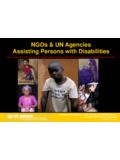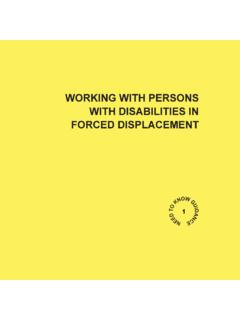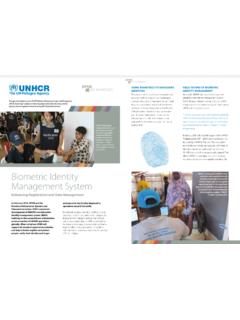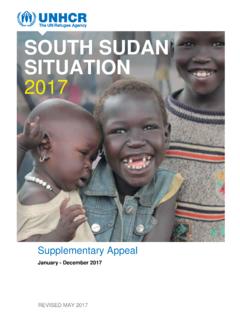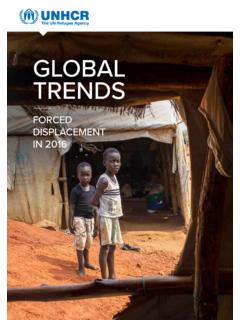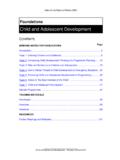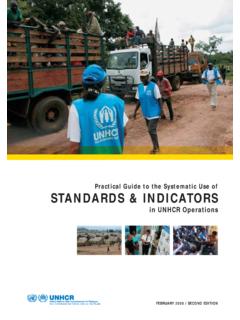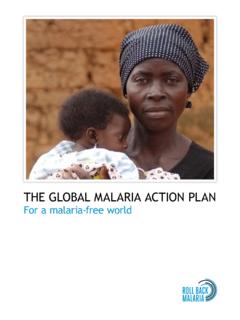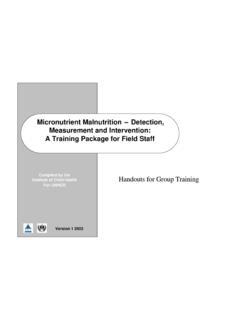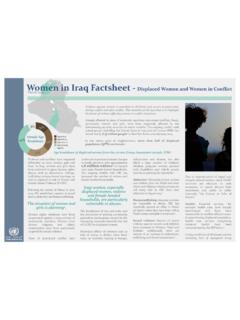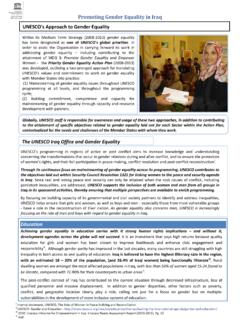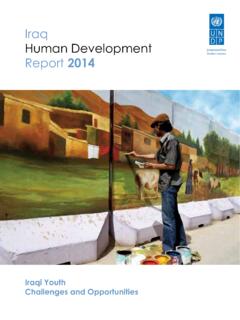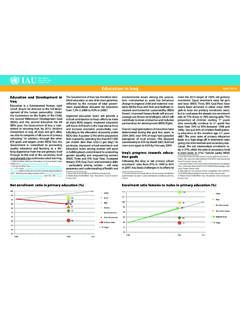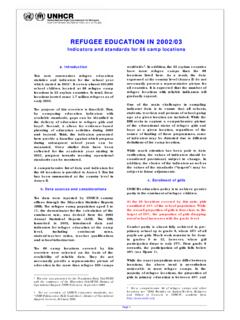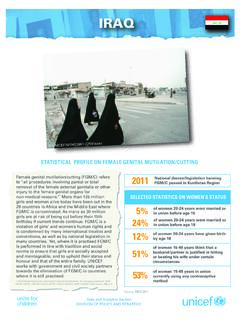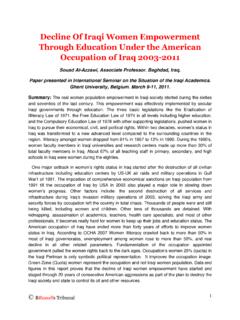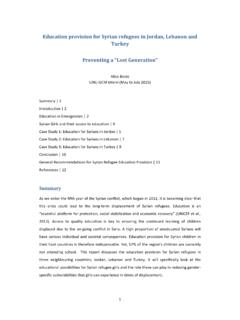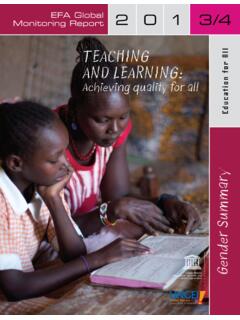Transcription of Iraq - UNHCR
1 ATAGLANCEMain Objectives and ActivitiesEnsure international protection andseek durable solutions for refugeesfrom the Islamic Republic of Iranand Turkey, as well as for otherurban refugees; liaise with theauthorities to facilitate agreementon the voluntary repatriation ofrefugees; train Government author-ities and local NGOs on refugeelaw and promote the Government saccession to the 1951 Conventionand 1967 Protocol; co-operate withthe Government and local authori-ties to provide basic humanitarianassistance to all refugees, payingspecial attention to the needs ofrefugee women and Durable solutions were found for413 Iranian Kurdish refugees,who were resettled in third coun-tries and 264 Turkish refugees,who repatriated to their respec-tive country of origin with thehelp of UNHCR .
2 UNHCR processed the asylumapplications of the newly arrivedrefugees in the north; refugee sta-tus was granted and assistanceprovided to ten Syrian followed up on protec-tion matters for other refugees. Some 120 refugee womenreceived training and assistanceto engage in income-generatingactivities. Refugee women aboveprimary school age were givenpriority for adult literacy classes. A total of 8,497 children (3,869boys and 4,628 girls) attendedschool and 655 children, includ-ing 105 girls, received of ConcernMain Refugee TotalOf whom Per centPer centOrigin/Type of inUNHCRF emaleunder 18 Population CountryassistedIslamic Rep.
3 Of Iran 23,90023,9004756(Refugees)Turkey (Refugees)12,60012,6005659 iraq 3,7001,400--(Returnees)Islamic Rep. of Iran 850---(Asylum-seekers)Eritrea (Refugees)57010--Income and Expenditure (USD)Annual Programme Budget RevisedIncomeOther TotalTotalBudgetfromFundsFundsExpenditur eContributions1 Available2 Available3,945,6421,200,9012,173,2943,37 4,1953,374,1951 Includes income from contributions earmarked at the country allocations by UNHCR from unearmarked or broadly earmarked contributions, openingbalance and above figures do not include costs at ContextThe Government of iraq is not a signatory to the 1951 Convention, nor its 1967 Protocol.
4 But has played astrong role in providing legal and physical protectionto refugees, including those arriving in the countryprior to UNHCR s formal presence in 1988. At pres-ent, the Government provides assistance to all refugeesin the country under the ration system set up underUN Security Council resolution 986 (oil-for-food),while UNHCR provides complementary assistance torefugees residing in refugee camps and UN sanctions continue to have a serious impacton the welfare of the population and the refugees inIraq.
5 Although the oil-for-food programme has helpedabate some of the shortage of food and medicine, it hasnot addressed a number of major problems in thesteadily deteriorating sectors of health and nutrition, education , housing, sanitation, power-generation,transportation and communications. The social fabricof iraq is subject to huge stresses, and economic activ-ity is drastically reduced. In this context, theGovernment of iraq has requested that UNHCR increase its complementary assistance to responded through systematic assistance tothe Iranian Ahwazi refugees in the settlements in thecentre and south of the country.
6 Following an extensiveconsultation process in 2000, UNHCR agreed to meetthe costs incurred by the Government in establishingthe infrastructure of Makhmour camp. If socio-economic conditions continue to worsen, UNHCR will have no option but to respond to similar requestsin like manner, upgrading its involvement by provid-ing further assistance to three refugee camps and tenrefugee three northern governorates are not controlled bythe central authorities and fall within the USA/UK-declared no-fly zone.
7 Most of UNHCR s assistance isprovided to the refugees in the north, largely Iranianand Turkish refugees, whose options are limited by the256 UNHCR Global Report 2000confused political and military situation. The lives ofthe refugees are further destabilised by the close prox-imity to and influence of their countries of main constraints in 2000 were UNHCR s fundingshortfall, the overall security situation and the complexityof relations between the Islamic Republic of Iran, iraq andTurkey. UNHCR s financial difficulties repeatedly led tobudget reductions that compromised the credibility of itsoperations.
8 UNHCR tried to reactivate the voluntaryrepatriation of the Iranian refugees in iraq , and of Iraqirefugees in the Islamic Republic of Iran, but not muchprogress was made in talks between the two 2000, UNHCR had to conduct its operations in anatmosphere of either latent or openly violent were sporadic mortar attacks on Baghdad, onekilling four people and injuring 34. In a separate, unre-lated incident on 28 June, a gunman forced his way intoUN premises and killed one international and one localFAO staff member, injuring three others.
9 This incidentresulted in strict travel restrictions. Travel to some areaswas further restricted due to the continuing air three northern governorates (Dohuk, Erbil andSulemaniya) remained under UN security restrictions,hampering efforts to assist those in need. Factional ten-sions continued throughout the year, and at least onerefugee was injured as a result of a shoot-out in Julybetween different political shortage of funds resulted in the curtailment of sev-eral activities, including those to enhance the role ofwomen and children, and to improve the camp envi-ronment.
10 Activities to strengthen and insulate accom-modation against winter weather were drasticallyreduced. Assistance to the Iranian Ahwazi refugee groupcommenced two months behind schedule. The repairand maintenance of access roads and the water networkin Al-Tash refugee camp was postponed to 2001. Inaddition, the Office had difficulty procuring medicinesfor lack of and SolutionsUNHCR carried out refugee status determination in thenorthern areas. However, the Government held to itsposition that the individuals concerned should not berecognised as refugees as the Government had no effec-tive control over that part of the country and thereforecould not be expected to give asylum to a group of asylum-seekers not known to it on an individual recognised by UNHCR as refugees in theseareas were at times accused by the de facto local author-ities in the north of violating the law.

